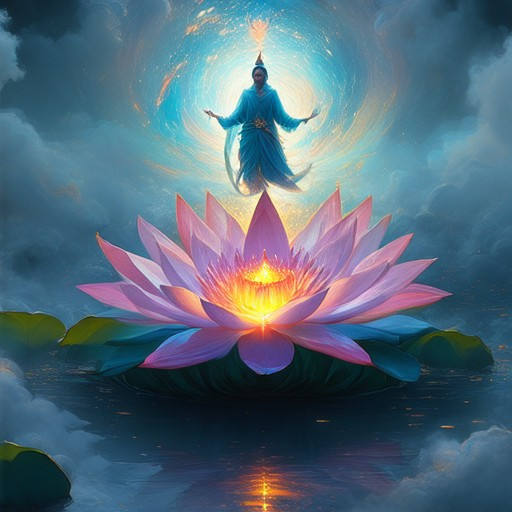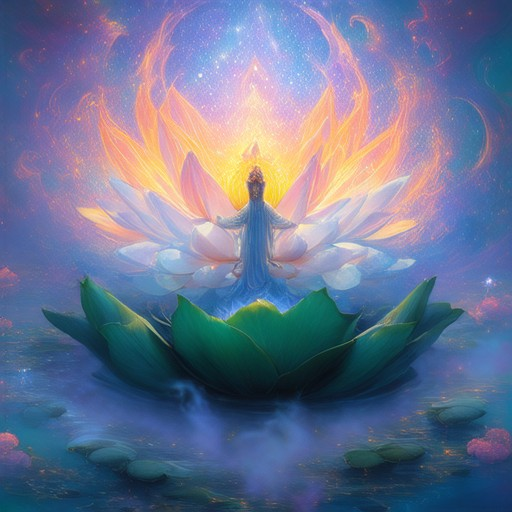The pursuit of self-realization is a profound journey that has captivated seekers for centuries. This transformative process involves a deep exploration of one’s true nature, blending introspection, spiritual growth, and a commitment to self-discovery. For many, this journey begins with an inquiry into the essence of life and the meaning of existence, often guided by timeless wisdom and teachings. Among the most influential figures to address this quest is Paramahansa Yogananda, whose insights into self-realization continue to inspire millions. In this article, we delve into the path to self-realization, drawing from Yogananda’s teachings, his connection to sacred texts, and the practical steps that can aid individuals on their own journey. From understanding the core principles of self-realization to exploring the role of self-love in this transformative process, we uncover the wisdom that can illuminate the way. Whether you are embarking on this journey for the first time or seeking deeper insights, this exploration offers a comprehensive overview of the journey to self-realization, its significance, and the enduring legacy of those who have shaped our understanding of it.
Key Takeaways
- Embracing Self-Realization: Discover the divine spark within yourself as taught by Yogananda.
- Essential Insights: Understand the core aspects of awareness, presence, and unity with the universal spirit.
- Achieving Realization: Explore paths through meditation, service, and studying ancient texts like the Yoga Sutras.
- Transformative Benefits: Experience clarity of purpose, inner peace, and compassion.
- Respecting Jesus’ Wisdom: Yogananda revered Jesus as a great teacher and symbol of divine love.
- Starting Point: Begin your journey with self-understanding and introspection to foster growth and transformation.

What is the Path to Self-Realization?
The journey toward self-realization is a deeply personal and transformative process, often guided by spiritual, philosophical, or psychological principles. While there are numerous paths to self-realization, some of the most commonly recognized approaches include:
- Karma Yoga : Rooted in the concept of balancing actions and intentions, karma yoga emphasizes ethical living and serving others. Practitioners believe that through selfless service, one aligns with their true selves and achieves unity with the divine.
- Bhakti Yoga : Focused on devotion and love for the divine, bhakti yoga involves cultivating a heartfelt connection to a higher power. This path is often associated with surrendering ego and trusting in a greater plan.
- Gyana Yoga : Centered around wisdom and knowledge, gyana yoga encourages intellectual exploration and understanding of the universe and one’s place within it. This path often involves study, reflection, and contemplation.
- Raja Yoga : Raja yoga, or royal yoga, is considered the most advanced path. It combines meditation, mindfulness, and spiritual discipline to achieve a state of consciousness beyond the physical realm.
Each path caters to individuals with different temperaments and lifestyles, offering unique tools for self-discovery and growth. Whether through service, devotion, wisdom, or meditation, the pursuit of self-realization ultimately aims to reveal one’s true nature and foster a deeper connection with the universe.
Yogananda’s Last Words
Paramahansa Yogananda, the renowned spiritual teacher and founder of the Self-Realization Fellowship, passed away on March 31, 1952, in Los Angeles. His final words were profound and reflective, encapsulating his deep understanding of the human spirit and its connection to the divine:
- “God made the earth, and man made confining countries and their fancy-frozen boundaries.”
- “Where Ganges, woods, Himalayan caves, and men dream God – I am hallowed, my body touched that sod.”
These words highlight Yogananda’s belief in the sacredness of nature and the enduring quest for spiritual awakening. He passed away peacefully, leaving behind a legacy of wisdom and a community dedicated to his teachings.

Did Yogananda Read the Bible?
Yes, Yogananda did read the Bible. Alongside the Hindu Bhagavad Gita and his own “Whispers from Eternity,” the Christian Bible was one of the scriptures he frequently referenced. He often spoke about how these texts inspired him, though his interpretations likely reflected his unique spiritual perspective. His engagement with diverse religious texts underscores his eclectic approach to spirituality, blending insights from various traditions to foster personal growth and reflection.

What is Self-Realization According to Yogananda?
Self-realization, as defined by Paramhansa Yogananda, is the profound understanding and recognition of the divine spark within every individual. He often described it as the “knowing” that you are already in possession of the kingdom of God, inherent within yourself. This realization transcends the need for external prayer or supplication, as it embodies the direct experience of the divine presence within.
The Core Concepts of Self-Realization
- Awareness: Self-realization involves becoming acutely aware of your true nature, beyond the superficial layers of ego and identity. It is a state of heightened consciousness where you recognize the unity of your being with the universal spirit.
- Presence: This realization fosters a deep sense of presence, where every moment is lived with purpose and clarity. You understand that your actions and decisions are aligned with the divine will.
- Unity: Self-realization reveals the interconnectedness of all existence. You see the universe as a manifestation of the same divine energy that resides within you.
Methods to Attain Self-Realization
- Meditation: Yogananda emphasized the power of meditation as a means to dissolve the veil between the temporal self and the eternal spirit. Through regular meditation, one can cultivate stillness and insight.
- Service: Engaging in selfless service (karma yoga) is seen as a vital path to self-realization. By dedicating your actions to the welfare of others, you align your life with the divine purpose.
- Study and Reflection: Deep study of sacred texts and reflection on timeless truths can illuminate the path to self-realization. Yogananda’s writings, such as The Yoga Sutras , offer practical guidelines for this journey.
Yogananda’s Teachings often stress the importance of finding a balanced approach to meditation that suits your unique constitution.
The Benefits of Self-Realization
- Clarity of Purpose: You gain a clear understanding of your life’s mission and the role you play in the grand scheme of existence.
- Inner Peace: The realization of your true self leads to a profound sense of inner peace and contentment, unaffected by external circumstances.
- Empathy and Compassion: Experiencing self-realization fosters a deeper connection to others, leading to increased empathy and compassion for all beings.
Ultimately, self-realization, as taught by Paramhansa Yogananda, is not a destination but a journey—a continuous deepening of your understanding of the divine within. It is a transformative experience that enriches every aspect of your life, guiding you toward a life of purpose, joy, and harmony with the universe.
What Did Yogananda Say About Jesus?
Yogananda, the Indian mystic and author of The Autobiography of a Yogi , expressed profound respect for Jesus Christ, viewing Him as a significant figure in the evolution of consciousness. He often referred to Jesus as a “great teacher” and recognized the wisdom embedded in His teachings. Yogananda emphasized that Jesus demonstrated a high level of awareness, even though he was human, and highlighted the universal truths that can be gleaned from His life and teachings.
In discussing Jesus, Yogananda frequently invoked the concept of Christ as a symbol of divine love and wisdom. He acknowledged the unique perspective Jesus brought to humanity, suggesting that His message transcended cultural and religious boundaries. Yogananda also believed that Jesus, like other great spiritual figures, pointed toward the ultimate truth of existence, which he described as the eternal, omnipresent presence of God.
Furthermore, Yogananda viewed the teachings of Jesus as part of a broader lineage of spiritual wisdom, suggesting that all major religious figures, including Buddha and Krishna, contributed to the collective understanding of enlightenment. He often stressed that these teachings were not contradictory but complementary, reflecting different facets of the divine wisdom available to humankind.
Ultimately, Yogananda’s perspective on Jesus was rooted in his belief that all true spiritual paths ultimately lead to the same truth, affirming the validity of Jesus’ contributions to the quest for higher consciousness.

What is the Very First Step in Self-Realization?
The very first step in self-realization begins with the process of understanding and accepting who you are in the present moment. This foundational step involves introspection, reflection, and self-assessment to gain clarity about your true nature, strengths, weaknesses, and purpose. By deeply exploring your thoughts, emotions, and experiences, you lay the groundwork for personal growth and transformation.
Self-realization is not merely about recognizing your current state but also about embracing it. This initial phase is crucial as it sets the stage for all subsequent steps toward self-improvement and actualization. Without a clear understanding of who you are, any efforts toward change may lack direction and purpose.
One effective method to facilitate this step is through journaling. Writing down your thoughts and feelings allows you to observe patterns and insights that might otherwise go unnoticed. This practice aligns with the principles promoted on Peter Spirito’s blog, which emphasizes the power of personal storytelling and reflective narrative in self-discovery.
By engaging in meaningful storytelling and thoughtful reflection, you can connect more deeply with your inner self, paving the way for a more authentic and fulfilling life. This process of self-exploration is not just about knowledge but also about wisdom, guiding you toward a more purposeful existence.
Ultimately, self-realization is a journey that begins with awareness and continues through ongoing exploration. Embrace this first step with curiosity and openness, as it is the essential precursor to every subsequent phase of personal development.




0 Comments